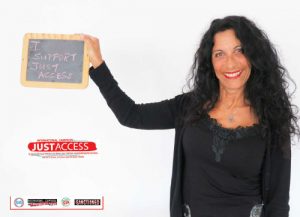| Press Release September 19, 2013 AmsterdamClick here to download pdf of the press releaseFor high resolution images, click here for Susan and here for Kees |
CONTACT Kamran Ashtary (NL, CET) +31 64 659 3979 Hadi Ghaemi (US, EST) +1 917 669 5996 |
Four diverse civil society organizations have launched JUST ACCESS (supportjustaccess.org), an international campaign to ensure access to medication, humanitarian goods, and other non-sanctioned items by people living in Iran. The campaign focuses on the unintended effects of economic sanctions on people living in Iran. Our objective is for the European Union to create a payment channel allowing the purchase of non-sanctioned items, such as medication and humanitarian goods.
The four organizations are Arseh Sevom, The International Campaign for Human Rights in Iran, United4Iran, and Sanctioned Life.
In the words of the US State Department, Iran is facing “unprecedented sanctions.” Iranian scholars affiliated with state institutions can no longer publish in scientific journals. Regulations prevent international banking. The value of domestic currency has plunged, while the cost of living has soared.
Access to medication for people suffering from hemophilia and thalassemia has been especially difficult to obtain.[i] Many suffering from cancer and chronic diseases are left untreated. The survivors of chemical attacks launched by Saddam Hussein during the Iran-Iraq war are facing shortages and high costs[ii]. Some of this can be alleviated by allowing international money transfers.
The goal of sanctions is to target Iran’s ruling elite. In fact, they are achieving the opposite by harming civil society and squeezing Iran’s poor and middle classes.
Arseh Sevom’s director, Kamran Ashtary says:
“For those of us operating in the diaspora, the pressure put on Iran’s middle class and poor when it comes to access to life-saving healthcare and other humanitarian aid is something we cannot ignore. How can we work for expanding rights and freedoms when many in Iran face a daily struggle just to survive?”
Economic sanctions in their present form hurt potential forces for change in Iran. Because they are so broad, economic sanctions take the focus off the repression of civil society and put it on the economic harm inflicted by the West.
Director of the International Campaign for Human Rights in Iran Hadi Ghaemi states:
“Economic and banking sanctions as they are currently implemented are hurting ordinary people and do not serve any constructive purpose. The implementation needs to be immediately modified to ensure average Iranians have proper access to medicine, medical care, nutrition, and humanitarian goods. Currently shortages in these domains only strengthen the regime and provide it an excuse to justify its repression with its propaganda that the country is ‘under foreign siege.’ The civil society and its actors are most harmed by this environment and will be significantly weakened if the sanctions continue in their current format.”
Fifty percent of respondents to a recent Gallop Poll[iii] reported having insufficient money for food and shelter. Indicators show that as the economy falters, Iran’s women are losing hard-won gains in education and are being encouraged to marry younger. Over the past eight years, radiology costs have increased between 500 to 800 percent[iv].
The European Union can help take some of the pressure off of civil society in Iran by allowing a payment channel for non-sanctioned items. The items are already exempt. The Just Access campaign aims to get EU officials to make changes to policy that will allow purchases to be made in a controlled and monitored manner.
For more information please contact:
KAMRAN ASHTARY (NL, CET) +31 64 659 3979
HADI GHAEMI (US, EST) +1 917 669 5996
[i] Arseh Sevom. Medicine Shortage Threatens Lives of Hemophiliac Children in Iran (August 2012) https://www.arsehsevom.org/en/2012/08/iran-civil-society-sanctions-block-delivery-of-medication-to-new-policies-limit-educational-choices-for-girls/
[ii] Tehran Bureau on The Guardian. Iran’s chemical weapon survivors show twin horrors of WMD and sanctions http://www.theguardian.com/world/iran-blog/2013/sep/02/iran-chemical-weapons-wmd-sanctions (September 2, 2013)
[iii] Gallup Poll. Half of Iranians Lack Adequate Money for Food, Shelter http://www.gallup.com/poll/163295/half-iranians-lack-adequate-money-food-shelter.aspx (July 1, 2013)
[iv] Deutsche Welle [fa] قیمت گاز مورد استفاده امآرآی ۱۵ برابر شده است http://bit.ly/14J2yIg, quoted in English https://www.arsehsevom.org/en/2013/08/1479/ (August 14, 2013)



